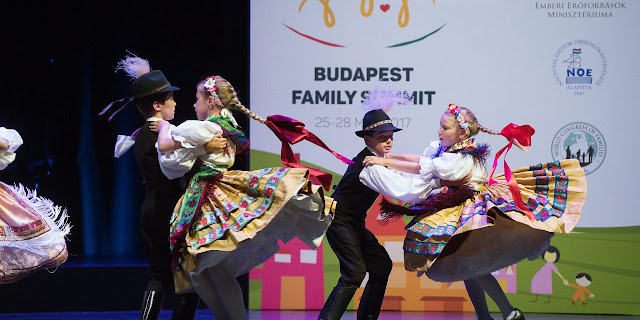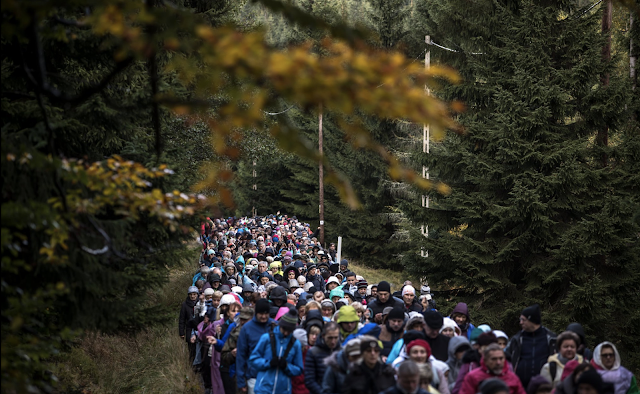 |
| Prime Minister Viktor Orban giving his speech during the Budapest Family Summit. Photo: About Hungary Blog/PM Orbán at World Congress of Families XI summit: 2018 will be the year for families |
Hungarian Prime Minister Viktor Orbán declared 2018, to be the "Year of the Families"; a declaration made on May 25, during his opening speech at the Budapest Family Summit.
It is a declaration that not only spotlights a nation's strength relies on its people—and fundamental to that is the family, the primary cell of society—but also seeks to address the declining birth rate experienced by many countries in Europe (including Hungary) with real and immediate solutions that will help families have more children.
The World Congress of Families (WCF) and the International Organization for the Family (IOF) chose Hungary for the second time to host this summit—whose theme was “Building Family-Friendly Nations: Making Families Great Again”—because Hungary, as the WCF Managing Director Larry Jacobs put it, "...[H]as demonstrated its strategic leadership as an advocate for the natural family in Europe." Here is what the WCF also published about why they chose Hungary:
Hungary’s leadership in defense of family, life, and Christianity is well known in Europe. The adoption of key provisions in the Hungarian Constitution in 2011 defining marriage between a man and a woman and protecting human life from conception to natural death have made the Orban government the hero of pro-family and pro-life leaders from all over the world. Hungary’s leadership is fully committed to family friendly governance and has recently launched a new national motto, 'Hungary, the Family Friendly Country.'In Hungary's constitution, The Fundamental Law of Hungary, there are four provisions that specifically point to the truth and accuracy of Jacobs' statements. The first is contained within the National Avowal, which states, "We hold that the family and the nation constitute the principal framework of our coexistence, and that our fundamental cohesive values are fidelity, faith and love." (2)
The second is located at FOUNDATION Article L, "(1) Hungary shall protect the institution of marriage as the union of a man and a woman established by voluntary decision, and the family as the basis of the survival of the nation. Family ties shall be based on marriage and/or the relationship between parents and children."
The third is under FREEDOM AND RESPONSIBILITY Article II, "Human dignity shall be inviolable. Every human being shall have the right to life and human dignity; the life of the foetus shall be protected from the moment of conception."
The fourth is at FREEDOM AND RESPONSIBILITY Article XV, "(5) By means of separate measures, Hungary shall protect families, children, women, the elderly and persons living with disabilities."
Hungary's constitution is impressive; reading it is time well spent. For those interested in knowing more about it, consider my post of December 2016, Viktor Orbán: A True Leader of and for the People of Hungary and Hungary's Constitution The Fundamental Law of Hungary.
It comes as no surprise that Hungary was chosen to host this summit; part of the goal of this summit, as stated on the WCF website, was to "...[S]trengthen our existing international network and help launch a new global profamily alliance of countries dedicated to defending marriage, the family and the sanctity of human life.”
Since Orbán and the party he leads, the Fidesz Party, was elected in 2010, the government has spent 9.7 billion EUR in support of families. Debt relief, child support, family housing incentives, support for household modernization are just some of the latest measures put into place to help families.
It is part of a demographic battle that Orbán is fighting—an approach that seeks to strengthen families from within Hungary rather than rely on the false solution of immigration—knowing full well that strong families will create a strong, competitive, and prosperous Hungary for current and future generations.
The family is at the center of Orbán's vision of the future! It is Orbán's firm belief that protecting families, no matter what the costs, is essential.
Orbán certainly articulated that very belief during his speech at the Budapest Family Summit (World Congress of Families XI); a speech worth reading to not only better understand the importance of the family, but to capture the strength and intelligence of Orbán's leadership.
The family is at the center of Orbán's vision of the future! It is Orbán's firm belief that protecting families, no matter what the costs, is essential.
Orbán certainly articulated that very belief during his speech at the Budapest Family Summit (World Congress of Families XI); a speech worth reading to not only better understand the importance of the family, but to capture the strength and intelligence of Orbán's leadership.
A safe society is a fundamental component of any government's plan to protect families, which Orbán highlighted in the first part of his speech, when referring to Brussels' so-called "refugee" resettlement scheme and the migrant crisis that it created.
 |
| Hungary's southern border fences along the Hungarian-Serbian border. Photo: About Hungary Blog/Hungary’s southern border fence has been protecting the frontier of Europe for two years |
Orbán responded to that threat with the building of two border fences along the border with Serbia, as well as establishing border-hunters (specially trained border guards), who form part of a security force: modern-day border-fort garrisons, police officers, and the defence forces.
Not only has Orbán brought the Balkan-migrant route—of which Hungary is an extension—to a complete halt, but he has enabled Hungarians to live in a peaceful and safe society; and in the process, has inspired confidence in young people to have families, secure in the knowledge that throughout Hungary will echo the "Happy cries of children rather than sirens from police cars and ambulances."
Today, Hungary is one of the safest countries in Europe!
The danger for Hungary and Europe is not over as Orbán pointed out, "It is only a matter of time and political expedience before millions of people who are ready to set out are once again channelled in our direction." (1) The coalition of human rights activists and people smugglers continue to work to send waves of migrants—mostly men in their prime—in the direction of Europe.
Recent developments prove Orbán to be absolutely correct as has been reported by Government Spokesman Zoltán Kovács in his latest blog post, European Parliament speeds up realization of the Soros plan.
In that post, Kovács spotlights the proposal made by the European Parliament's Committee on Civil Liberties, Justice and Home Affairs (LIBE) for a limitless resettlement quota scheme, that coupled with what he described as a "Hungary-bashing report," points to a pro-immigration agenda that will attempt to strong-arm any member that refuses to cooperate.
 |
| Hungarian youth and traditional dancing at the Budapest Family Summit. Photo: Daily News Hungary/INTERNATIONAL FAMILY SUMMIT – ORBÁN: GOVERNMENT TO INCREASE FAMILY TAX BENEFITS |
One of the most salient points in the speech that Orbán so candidly spoke of, is the declining birth rate among European countries, including Hungary. He went on to state that, "...The time for straight talking has come. Europe, our common homeland, is losing out in the population competition between great civilisations. Fewer and fewer marriages are producing fewer and fewer children, and the population is therefore ageing and declining." (2)
There are two views on how to solve this problem. The first sees immigration as the answer, while the other view taken by Central Europe (including Hungary) is that they must solve the demographic problem by relying on their own resources; a truth that Orbán stated must be acknowledged through a spiritual renewal.
To put the declining birth rate in Hungary into perspective, Orbán cited from national statistics on Hungary's population in 1980, when the population was at 10,709,000 people; by 2017, that figure dropped to 9,799,000. It is a dramatic drop in population—a loss of almost 1 million people—which as Orbán pointed out, "...[I]s more than all the casualties we sustained in World War II." (2)
So important is the need to address the declining birth rate that Orbán refers to the restoration of natural reproduction not only as a national cause, but "the national cause."
Orbán's goal is to raise the birth rate to 2.1% by 2030, which will require responsible family policies that must be pursued for decades, over the course of several governments. Orbán considers this to be the first precondition for the population turnaround.
The second precondition is a powerful financial engine, "A competitive model that is full of energy." Elaborating further on this Orbán stated that any major political, social and intellectual turnaround always requires financial resources:
As far as we Hungarians are concerned, I can tell you that here economic growth is in a range between three and five per cent. This is the magical GDP growth. Government debt is declining and unemployment is coming to an end. Because our economic policy has been successful, the next target of our general and economic policy is to promote the number of children being born. It is to this that we’ve adjusted our fiscal system, it is to this that we’ve adjusted our housing support system; and our work-based economic system – with which we shall soon reach full employment – also serves this purpose. (3)
The third precondition for a successful demographic turnaround is for Europe to be in "good shape"; that is, each country's economic plan has to include support for the family. So important is this that Orbán stated, "If as a unit of community the family does not occupy first place in the hearts of young people, however, economic strength and excellent national economy figures are in vain: we cannot achieve anything." (3) Hungary spends 4.6% of GDP on family support.
Orbán acknowledged the simple truth that it is essential to pursue a policy that removes obstacles from the path of young people if more children are to be born. It was in the spirit of this truth, that he declared 2018, as the "Year of the Families."
Accompanying that declaration is an action plan that will help to ensure young people are financially supported and encouraged to have more children. There is no better way to understand that action plan than to read it from Orbán's own words:
Using the analogy of a ship sailing into the wind Orbán pointed out that obstacles do exist, but no matter what those obstacles are, with perseverance, courage and the backing of like-minded allies, together Hungary and Europe, just like a ship that knows what port it is aiming for, will reach its destination.
Orbán acknowledged the simple truth that it is essential to pursue a policy that removes obstacles from the path of young people if more children are to be born. It was in the spirit of this truth, that he declared 2018, as the "Year of the Families."
Accompanying that declaration is an action plan that will help to ensure young people are financially supported and encouraged to have more children. There is no better way to understand that action plan than to read it from Orbán's own words:
We’ve decided to further raise the rates of family tax allowances, and to place families with two children at the centre of this, as they represent the largest section in Hungary. And I’ve learnt that where there is room for two, there is also room for three – or even four. Braver families may even find room for five. For young women with two children and student loans, the Government will cancel fifty per cent of their debt, and for those with three or more children one hundred per cent of the student loan debt will be cancelled. For graduates we shall extend the term of maternity leave by a year, and for university students it is extended until the child reaches the age of two. Hungarians 3/4 understand the meaning of this family policy measure. “My home is my castle”: this is how the Hungarians think, and this is another reason why it is difficult to adopt a good policy here. We have decided that families with mortgages can have one million forints written off their debt if they have three children, and one million forints will be written off for each further child, with the state bearing the burden. Finally, we shall embark on infant day care developments on an unprecedented scale. We are going to build infant day care centres everywhere families live, and we shall renovate existing infant day care centres wherever necessary. We are also opening up our family support system – although cautiously – to fellow Hungarians who live outside the borders As a result, from next year they may also be eligible for maternity support after the birth of children, and baby bonds will be available across the entire Carpathian Basin. (4)If that wasn't impressive enough, Orbán also announced the establishment of a research institute that will serve to better Hungary's spiritual and intellectual competitiveness, and good policy planning. The institute will become an international think tank that will, as Orbán put it, "...[P]rovide sufficient knowledge and intellectual munition to help and support families, laying the philosophical foundations for our family policy, and enabling accurate understanding of the situation in Europe and the world." (4)
Using the analogy of a ship sailing into the wind Orbán pointed out that obstacles do exist, but no matter what those obstacles are, with perseverance, courage and the backing of like-minded allies, together Hungary and Europe, just like a ship that knows what port it is aiming for, will reach its destination.
The brave, responsible, and intelligent leadership of Prime Minister Viktor Orbán has proven itself for seven straight years, and there is every reason to believe that Hungary's progress and growth will continue for many years to come: the Hungarian model is working and it shows!
Such is the kind of leadership that other countries should be seeking if they are serious about: a major demographic turnaround; protecting and strengthening the family; securing their borders; and guarding against all threats to their Christian identity, heritage, and culture.
God bless Prime Minister Viktor Orbán for continuing to demonstrate the kind of leadership that is so desperately needed in many countries in Europe, in Canada, and throughout the world.
May 2018, be a great year for the families!
God bless Prime Minister Viktor Orbán for continuing to demonstrate the kind of leadership that is so desperately needed in many countries in Europe, in Canada, and throughout the world.
May 2018, be a great year for the families!




